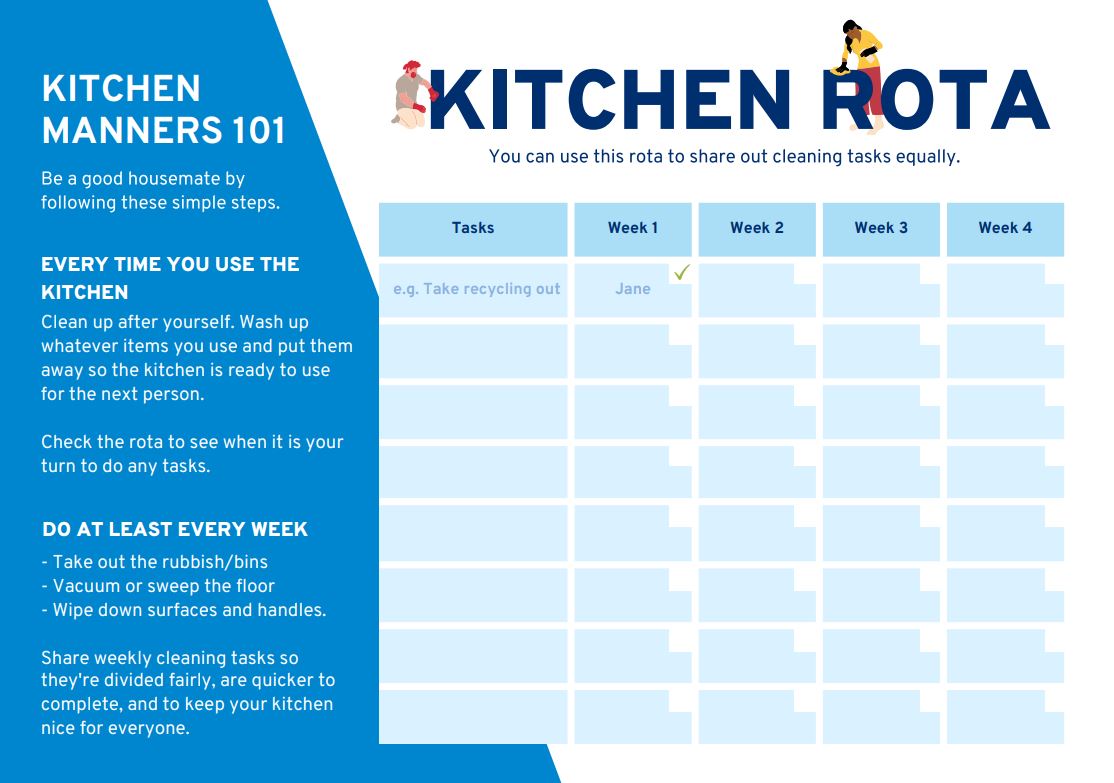University accommodation could be the place where you go onto make life long friends. However, we all know it’s not always that easy and that might take some work in early stages to get into the flow of living with new people. Creating a happy household requires effort, communication, and a positive mindset. Find out more from Caroline, our local Residential Life Assistant.
Even with your best foot forward, disagreements between housemates can occur, meaning you need to have a proactive approach to resolving any conflicts before they escalate. Resolving issues requires patience, understanding, and a willingness to work together. By approaching conflicts respectfully and focusing on finding solutions, you can foster a healthier and more peaceful household environment. Check out our strategies below to find out how you can work to maintain a happy, healthy household.
Shared responsibilities and teamwork:
Create a sense of shared ownership and responsibility for the household. Involve everyone in decision-making and distribute tasks equitably based on each other’s strengths. Encourage teamwork and collaboration in maintaining cleanliness, organising, and other household duties, such as dedicating a day to cleaning together or agreeing to a cleaning rota (PDF 492KB).

Respect personal space and boundaries:
Encourage and respect personal space, privacy, and boundaries. Recognise that everyone needs time and space to chill out and recharge. They may not want to be included in all activities. Avoid invading others’ personal space without permission and ensure that noise levels and activities align with your house/flatmates’ needs.
Evaluate your demands:
If you experience issues with your house/flatmates, first consider whether raising the issue will positively impact your household. For example, someone humming may be annoying, but is it worth having a sit-down conversation over? However, if someone repeatedly borrows your personal belongings without permission, then this should be addressed.
Practice kindness and empathy:
Encourage acts of kindness and empathy within the household. Small gestures, like helping with chores or providing emotional support, can go a long way in creating a positive and caring environment.

Quality time and bonding activities:
Allocate dedicated time for shared activities and bonding. This can be achieved by having dinner together or planning days out on weekends. Plan and participate in activities that bring joy and foster connections, such as game nights, movie marathons, or outdoor outings.
Address any issues promptly:
Avoid letting any conflicts escalate by addressing them as soon as they arise. Ignoring or delaying the discussion could lead to further tension and resentment. Choose an appropriate time and place to have a calm and focused conversation, do not use passive-aggressive Post-It notes to voice your concerns! Give each person involved in the conflict an opportunity to express their thoughts and feelings. Show empathy, and practice active listening. Try to understand their perspective without judgment, as we all have different expectations. → Check out our How to Handle housemate conflicts blog for more tips!
Find compromises and solutions:
Brainstorm possible solutions together. Consider different options and be flexible in finding a resolution that satisfies everyone involved. Look for win-win solutions that address the concerns of all parties as much as possible. This could be reserving the weekends for parties or dedicating a day where everyone cleans together.

Seek mediation if necessary:
Remember, cultivating a happy household is an ongoing process that requires everyone’s active participation and commitment. Be patient, flexible, and understanding while you work together to create a joyful and harmonious home environment.
In situations where conflicts persist or become too difficult, consider involving a neutral third party to mediate. Why not book an appointment with the Student Support and Wellbeing team who can assist you with any difficulties you are experiencing.

